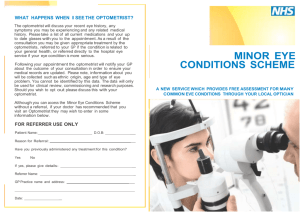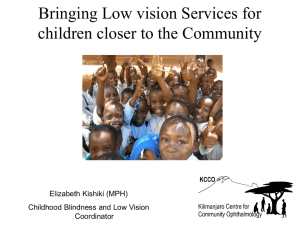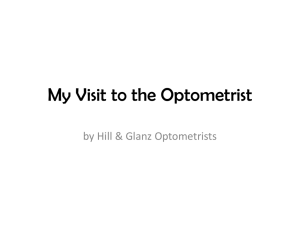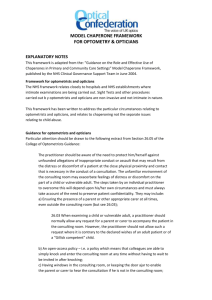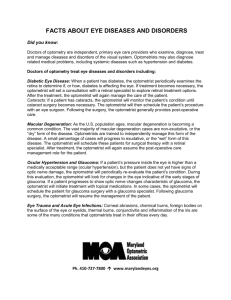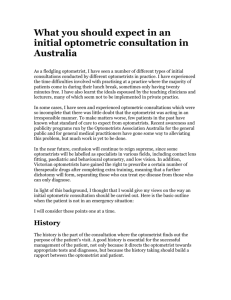business, professions and economic development
advertisement
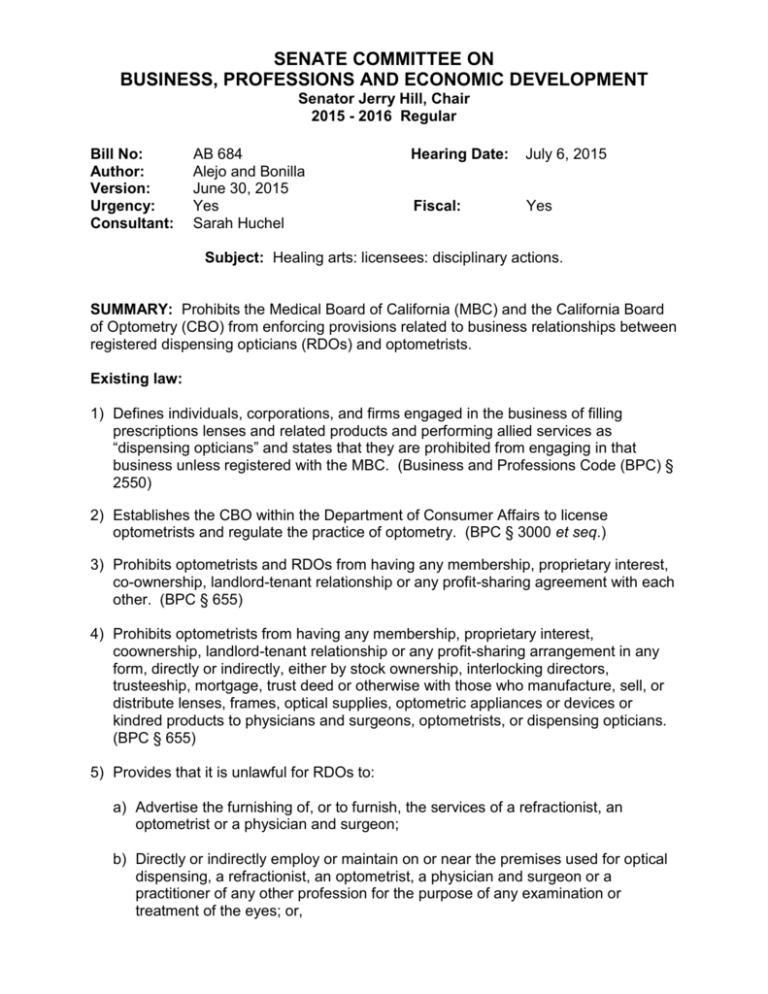
SENATE COMMITTEE ON BUSINESS, PROFESSIONS AND ECONOMIC DEVELOPMENT Senator Jerry Hill, Chair 2015 - 2016 Regular Bill No: Author: Version: Urgency: Consultant: AB 684 Alejo and Bonilla June 30, 2015 Yes Sarah Huchel Hearing Date: July 6, 2015 Fiscal: Yes Subject: Healing arts: licensees: disciplinary actions. SUMMARY: Prohibits the Medical Board of California (MBC) and the California Board of Optometry (CBO) from enforcing provisions related to business relationships between registered dispensing opticians (RDOs) and optometrists. Existing law: 1) Defines individuals, corporations, and firms engaged in the business of filling prescriptions lenses and related products and performing allied services as “dispensing opticians” and states that they are prohibited from engaging in that business unless registered with the MBC. (Business and Professions Code (BPC) § 2550) 2) Establishes the CBO within the Department of Consumer Affairs to license optometrists and regulate the practice of optometry. (BPC § 3000 et seq.) 3) Prohibits optometrists and RDOs from having any membership, proprietary interest, co-ownership, landlord-tenant relationship or any profit-sharing agreement with each other. (BPC § 655) 4) Prohibits optometrists from having any membership, proprietary interest, coownership, landlord-tenant relationship or any profit-sharing arrangement in any form, directly or indirectly, either by stock ownership, interlocking directors, trusteeship, mortgage, trust deed or otherwise with those who manufacture, sell, or distribute lenses, frames, optical supplies, optometric appliances or devices or kindred products to physicians and surgeons, optometrists, or dispensing opticians. (BPC § 655) 5) Provides that it is unlawful for RDOs to: a) Advertise the furnishing of, or to furnish, the services of a refractionist, an optometrist or a physician and surgeon; b) Directly or indirectly employ or maintain on or near the premises used for optical dispensing, a refractionist, an optometrist, a physician and surgeon or a practitioner of any other profession for the purpose of any examination or treatment of the eyes; or, AB 684 (Alejo) Page 2 of 7 c) Duplicate or change lenses without a prescription or order from a person duly licensed to issue the same. (BPC § 2556) 6) Establishes the Knox-Keene Health Care Service Plan Act of 1975 which establishes rules for mandatory basic services, financial stability, availability and accessibility of providers, and other standards for patient care. (Health and Safety Code (HSC) §§ 1340 et seq.) 7) Declares Legislative intent and purpose to promote the delivery and the quality of health and medical care to the people of the State of California who participate in a health care service plan by: a) Ensuring the continued role of the professional as the determiner of the patient’s health needs which fosters the traditional relationship of trust and confidence between the patient and the professional. b) Prosecuting malefactors who make fraudulent solicitations or who use deceptive methods, misrepresentations, or practices which are inimical to the general purpose of enabling a rational choice for the consumer public. c) Ensuring that subscribers and enrollees receive available and accessible health and medical services rendered in a manner providing continuity of care. (HSC § 1342) This bill: 1) Prohibits an individual, corporation, or firm operating as a RDO before the effective date of this bill, or an employee of such an entity, or an optometrist licensed before the effective date of this bill, from being subject to any action by the MBC, the CBO, another state agency, or a district attorney for engaging in any prohibited business relationship between optometrists and RDOs, as specified. 2) Prohibits this bill from being construed to imply or suggest that a RDO or optometrist engaging in any business relationship is in violation of or in compliance with the law. 3) Prohibits this bill from applying to any business relationships prohibited by specified law that are registered and operating on or after the effective date of this bill. 4) States that nothing in this bill shall prohibit an individual, corporation, or firm operating as a RDO from engaging in a business relationship with a licensed optometrist before the effective date of this bill at locations registered with the MBC before the effective date of this bill. 5) Prohibits any individual, corporation, or firm, or an employee of such an entity, operating as a RDO before the effective date of this bill, from being subject to any action for advertising the furnishing of, or furnishing, the services of a refractionist, an optometrist, or a physician and surgeon; or directly or indirectly employing or maintaining on or near the premises used for optical dispensing, a refractionist, an AB 684 (Alejo) Page 3 of 7 optometrist, a physician and surgeon or a practitioner of any other profession for the purpose of any examination or treatment of the eyes. 6) Prohibits this bill from being construed to imply or suggest that a RDO is in violation of or in compliance with the law. 7) Prohibits this bill from applying to any business relationships prohibited by specified law that are registered and operating on or after the effective date of this bill. 8) States that nothing in this bill shall prohibit an individual, corporation, or firm operating as a RDO from engaging in a business relationship with a licensed optometrist before the effective date of this bill at locations registered with the MBC before the effective date of this section. 9) Sunsets the above provisions of this bill on January 1, 2017. 10) Tolls the limitations period during the time this bill is in effect for any actions taken against an individual or entity’s license or registration in regards to a violation discussed in this bill. 11) States that this bill is an urgency statute necessary for the immediate preservation of the public peace, health, or safety within the meaning of Article IV of the Constitution and shall go into immediate effect. The facts constituting the necessity are: In order to protect various businesses, opticians, and optometrists who engage in a business relationship that is prohibited by specified law from discipline by the MBC, the CBO, or other state agency with enforcement authority while the Legislature, with the assistance of appropriate regulatory agencies, develops a model that will allow California businesses to provide services to patients and also protect the interests of practitioners. FISCAL EFFECT: This bill is keyed “fiscal” by the Legislative Counsel. According to the analysis by the Assembly Appropriations Committee dated May 20, 2015, this bill will have negligible state fiscal effect. COMMENTS: 1. Purpose. This bill is sponsored by the Author. According to the Author’s office, “Current state law governing the relationship between optometrists and opticians, co-located sellers of eyewear has not been updated for many years. The result is that these laws no longer reflect today’s realities and needs as the health care landscape has evolved significantly. This evolution, evidenced by the rise of HMO’s, proliferation of convenient care and co-located healthcare clinics, changing provider relationships, and now the Affordable Care Act, requires that California law and policy also evolve to effectuate the state’s goals of increased access to quality, affordable care…. “AB 684 will temporarily allow [vision care centers] to continue to operate in the state by suspending any new disciplinary action against optometrists and opticians AB 684 (Alejo) Page 4 of 7 by the Board of Optometry and the Medical Board of California until January 1, 2017, while negotiations continue on a permanent fix [to California law restricting certain business arrangements affecting optometrists and opticians].” 2. Background. This bill is a result of over a decade of litigation debating the legitimacy of current law prohibiting certain business relationships between an optometrist and a registered dispensing optician. The final case, National Association of Optometrists & Opticians v. Harris, 682 F.3d 1144 (9th Cir.2012) affirmed California statutes. The plaintiffs in the case, the National Association of Optometrists and Opticians, LensCrafters, Inc., and Eye Care Centers of America, Inc., argued that the laws prohibiting licensed opticians from offering prescription eyewear at the same location in which eye examinations are provided and the advertising that eyewear and eye examinations are available in the same location, violate the dormant Commerce Clause. The plaintiffs argued it was unfair that optometrists and ophthalmologists may set up a practice where patients may receive both eye examinations and prescription eyewear, but opticians may offer only the sale of eyewear, not eye examinations, and therefore are unable to offer the convenience of "one-stop shopping" in California. The Court upheld the California law as constitutional, stating that the law was not discriminatory and did not place a significant burden on interstate commerce “just because it precludes a preferred, more profitable method of operating in a retail market.” While the decision placed a final affirmation on existing law, determining its impact on California’s optical market has not been concluded. The law did not anticipate the myriad leasing, co-locating, and employment relationships that sprung up during its debated legality. 3. Practice Models. There are several basic ways in which California consumers obtain eye exams and prescription eyewear: a. Private practice. An optometrist owns his or her own location in which the optometrist provides eye examinations and sells prescription eyewear. b. Co-located optician and optometrist. Many department stores, warehouse stores, and retail stores have a full-service optical department that offer an eye exam and prescription eyewear in one place. The business arrangements governing these entities vary, but there is usually a lease of space involved, with varying contract terms. c. Full Service HMO: Kaiser Permanente offers eye examination services and optical dispensing services at same location. d. Optician-Owned Dispensary: A RDO offers prescription eyewear but does not offer or provide access to optometrist/eye examination services. AB 684 (Alejo) Page 5 of 7 It is currently unsettled as to the legality of co-located optometrists and opticians, and hundreds of jobs and access to eye care are at stake until there is agreement as to the appropriate nature of the business types. This bill will provide a safe harbor to individuals involved in business relationships that may be subject to current prohibitions until January 1, 2017, at which time an agreement among stakeholders is anticipated. 4. Related Legislation. AB 595 (Alejo) of 2015 would have specifically authorized in statute vision care models that currently exist in California where a registered dispensing optician is located next to an optometrist. (Status: This bill is currently pending in the Assembly Business and Professions Committee.) 5. Arguments in Support. Wal-Mart Stores, Inc., on behalf of Walmart Vision Centers and Sam’s Club Opticals … is pleased to write in supp9ort of AB 684, which will protect vision care access for Californians while the state deliberates the best way to bring clarity to outdated laws governing how and where optometrists may provide vision care services in the state.” LensCrafters writes in support, “Optometrists associated with EYEXAM of California, our sister company, and a Knox-Keene licensed vision care plan have been providing quality vision care to patients at LensCrafters locations for 28 years. These optometrists are closely regulated by the state, and patients value the convenience, accessibility and flexibility of being able to receive comprehensive eye care at a location where they do other shopping and where they can receive services during the evenings and on weekends. However, years of litigation relating to a 1960s law have caused ambiguity about whether doctors can continue seeing patients at vision care centers like ours. “LensCrafters has been part of a robust stakeholder process that includes our industry partners, the Attorney General’s office, and the Governor’s Office designed to put this issue to rest once and for all. As we continue these productive conversations, it is critically important that the more than 2 million Californians who receive eye care at one of California’s more than 600 vision care centers continue to have access to the high-quality care provided by the nearly 2,000 optometrists and support employees who work at these locations.” EYEXAM of California, For Eyes Optical Company, National Association of Optometrists and Opticians, National Vision, Inc. and its subsidiaries, Sears Optical, The California Chamber of Commerce, U.S. Vision, and numerous individuals express the same sentiment. 6. Arguments in Opposition. The California Optometric Association (COA) writes in opposition, “As amended, this measure would prohibit enforcement of Business and Professions Code Section 655 and 2556 until January 2017, and allow large corporate optical chains to put undue influence on an optometrist’s business practices, potentially impacting their clinical judgment about what is best for their patients. … AB 684 (Alejo) Page 6 of 7 “COA has fought for more than a decade to see these two laws enforced. The problems that have occurred have been severe and patient care has suffered. LensCrafters alone has paid more than $20 million in class action awards and has silenced critics with confidential settlements. The AG has official court examples of real harm that have happened when a patient believes they are getting a comprehensive eye exam that in a traditional setting would detect eye disease and end up receiving a cursory exam that is given to only sell eyeglasses and other product. In fact, the AG first initiated litigation because they found that the poor quality eye exam at Pearle Vision (owned by Luxottica, which is the same parent company as LensCrafters) was responsible for a patient’s blindness. These laws are in place for a good reason and they have been affirmed by the courts. “If a tweak to California law is necessary to modernize the statute and ensure retail optometry businesses like Costco that do not employ eye doctors can continue to operate, COA is more than willing to address those legitimate concerns this year. We can do that now without the need for a moratorium. COA cannot support a proposal that prevents the optometry and medical board from enforcing the law against all bad actors in the marketplace.” California Association of Dispensing Opticians “believes that [AB 684]’s proponents should not be rewarded for years of violation of California patient protection laws by a ‘get out of jail free card’ embodied in [this bill].” VSP Vision Care writes, “The sponsors and proponents of the bill failed in years of federal litigation to invalidate state patient protection laws. Those laws bar the specific business model established in California by the multinational corporate sponsors of the bill, and operated without regard to existing law during the sustained period of that unsuccessful litigation. … “Now, after over two-years of advertised meetings and discussions with the Department of Justice, ostensibly on how to come into compliance with California law, AB 684 is simply the latest bill sponsored by proponents to prolong operations in California while not complying with California law. “ SUPPORT AND OPPOSITION: Support: EYEXAM of California For Eyes Optical Company LensCrafters National Association of Optometrists and Opticians National Vision, Inc. and its subsidiaries Sears Optical The California Chamber of Commerce U.S. Vision Wal-Mart Stores, Inc. Numerous individuals AB 684 (Alejo) Page 7 of 7 Opposition: California Association of Dispensing Opticians The California Optometric Association VSP Vision Care -- END --
